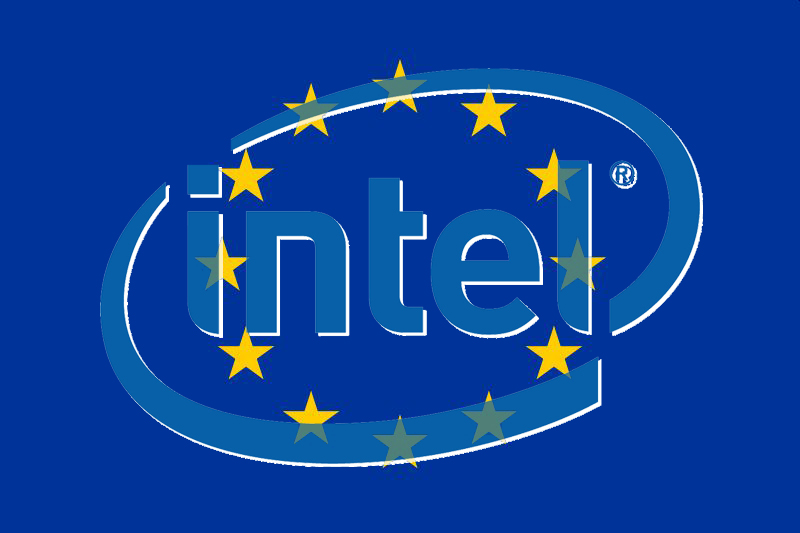EC: Intel 'abused dominant position' vs AMD; fined record $1.45 billion in antitrust case

The European Commission on Wednesday fined Intel a record €1.06 billion, or about $1.446 billion, for abusing its dominance in the computer chip market to exclude longtime rival AMD. (techmeme)
The move comes just a day after Intel CEO Paul Otellini was reported to say that chip orders for Q2 2009 have been "a little better than we expected" and refused to comment on the antitrust case.
The E.U. competition commissioner, Neelie Kroes, said the penalty against the world's largest chip maker was justified because the company had skewed competition and robbed consumers of choice.
Kroes said Intel "used illegal anticompetitive practices to exclude its only competitor and reduce consumers' choice — and the whole story is about consumers," adding that Intel's practices "undermined innovation."
From her remarks at the press conference:
"The Commission Decision contains evidence that Intel went to great lengths to cover-up many of its anti-competitive actions. Many of the conditions mentioned above were not to be found in Intel’s official contracts. However, the Commission was able to gather a broad range of evidence demonstrating Intel's illegal conduct through statements from companies, on-site inspections, and formal requests for information."
UPDATE: In a response, Intel CEO Paul Otellini had this to say:
"Intel takes strong exception to this decision. We believe the decision is wrong and ignores the reality of a highly competitive microprocessor marketplace – characterized by constant innovation, improved product performance and lower prices. There has been absolutely zero harm to consumers. Intel will appeal."
"We do not believe our practices violated European law. The natural result of a competitive market with only two major suppliers is that when one company wins sales, the other does not. The Directorate General for Competition of the Commission ignored or refused to obtain significant evidence that contradicts the assertions in this decision. We believe this evidence shows that when companies perform well the market rewards them, when they don't perform the market acts accordingly."
"Intel never sells products below cost. We have however, consistently invested in innovation, in manufacturing and in developing leadership technology. The result is that we can discount our products to compete in a highly competitive marketplace, passing along to consumers everywhere the efficiencies of being the world's leading volume manufacturer of microprocessors."
UPDATE 2: AMD executive vice president for legal affairs Tom McCoy had this to say in the company's official statement:
"After an exhaustive investigation, the EU came to one conclusion – Intel broke the law and consumers were hurt. With this ruling, the industry will benefit from an end to Intel's monopoly-inflated pricing and European consumers will enjoy greater choice, value and innovation."
UPDATE 3: More from AMD, this time from CMO Nigel Dessau: "I think [Otellini] doesn’t get, or has no remorse about, what they’ve been doing: disrespecting the consumer." More here.
The previous record fine for similar abuses in the EU was €497 million, or about $677 million, levied at -- you guessed it -- Microsoft in March 2004 for blocking competition in markets for server computers and media software.
ZDNet UK: Intel hit with record €1bn EU antitrust fine
EC statement and remarks
(The fine also is the largest ever imposed for any breach of competition law in the E.U.)
Focus on rebates
Kroes said Intel had pursued a strategy aimed mainly at excluding AMD by paying computer makers and retailers to postpone, cancel or avoid AMD products entirely.Kroes ordered Intel to cease offering rebates to computer makers that had helped it "maintain a share of about 80 percent of the market for microchip sales and blocked AMD from increasing its share beyond about 20 percent of that market," according to the New York Times.
Giuliano Meroni, the president of AMD's operations in Europe, said the decision would "shift the power from an abusive monopolist to computer makers, retailers and above all PC consumers."
Intel had no immediate comment, but it's safe to expect the company to appeal the fine and orders to change its practices.
Under the order, Intel must change its business practices immediately pending its appeal, but could request an injunction in the meantime. Intel must pay the fine immediately, though the sum will be held in a bank account until the appeals process is over, a process that could take years.
You might say Intel got off easy: the commission is entitled to levy fines up to 10 percent of a company's annual global sales; Intel's annual sales were $37.6 billion in 2008, thus making the maximum penalty nearly $4 billion.
Money collected in antitrust cases is added to the trade bloc’s annual budget of roughly €130 billion, or about $177 billion USD.
Just last year, the U.S. Federal Trade Commission stepped up its inquiries into Intel, opening a formal investigation.
E.U. regulators first began investigating Intel in 2001 after AMD filed a complaint the year before with the E.U. authority in Brussels. In two sets of charges in 2007 and 2008, the commission accused Intel of similar tactics: by abusing its dominant position in computer chips by giving large rebates to computer makers, by paying computer makers to delay or cancel product lines and by offering chips for powerful server computers at prices below actual cost.
The commission also charged the firm with paying retailers not to sell personal computers using AMD chips.
Intel has maintained that it has done nothing wrong and has suggested that E.U. officials have not provided Intel with proper rights of defense during the investigation.
The EC has ongoing inquiries into other U.S. companies, including Rambus, which holds patents on memory chips, and Qualcomm, which develops wireless technology for phones. Regulators are also questioning Cisco Systems, the world's largest maker of networking equipment, about whether it restricts competition for network maintenance services.
